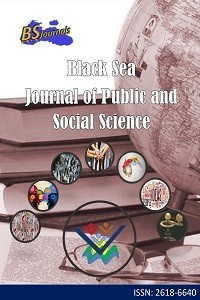Rural Roads for Sustainable Development and Improving Human Capabilities of Local Communities
Rural Roads for Sustainable Development and Improving Human Capabilities of Local Communities
Many rural poor in
developing countries live in areas far away from markets and isolation is a key
limiting factor to their livelihood. Rural roads in developing countries are
often seen as the least important linkage of the road transport system.
However, these rural roads provide access for countless rural communities and
their inhabitants. In this article, presenting various aspects of rural roads
and their role for human and sustainable development and improving capabilities
of local communities. For achieving this purpose, after a wide literature
review in related human development contexts, a broad field research work had
been done during 2015 - 2017 in rural regions of South Khorasan province, east
of Iran. Also researcher has been utilized from his observations, discussions,
interviews, experiences and pictures during 2005 - 2017. Finally discussing and
concluding ways that rural roads can play their best roles. Some of the
recommendations are participation of the villagers in the planning process of
establishing and maintaining rural roads that are necessary to take into
account their tangible needs, mobilizing local resources, and increasing speed
of implementation these projects by securing people’s cooperation.
Keywords:
Rural roads, Sustainable development, Human capabilities, Mobility, Local communities Iran,
___
- Ahmadvand M, Karami E, Zamani GH, Vanclay F. 2009. Evaluating the use of Social Impact Assessment in the context of agricultural development projects in Iran. Envir Impact Assess Rev, 29: 399–407.
- Ahmed F, O’Neill P, Salter D. 2007. Formulating rural road policy and strategy in a developing country environment with key stakeholders including academic institutions. International Conference on Engineering Education & Research, 19: 1-6. Asian Development Bank. 2013. Gender Tool Kit: Transport Maximizing the Benefits of Improved Mobility for All - ISBN 978-92-9254-145-3 (Print), 978-92-9254-146-0 (PDF): 6 ADB Avenue, Mandaluyong City 1550 Metro Manila, Philippines.
- Asomani-Boateng R, Fricano RJ, Adarkwa F. 2015. Assessing the socio-economic impacts of rural road improvements in Ghana: A case study of Transport Sector Program Support (II). Case Stud Transport Pol, 3: 355–366.
- Binswanger-Mkhize HP, Byerlee D, McCalla A, Morris M, Staatz J. 2011. The growing opportunities for African agricultural development. ASTI/IFPRI-FARA Conference, December 5-7 2011, Accra, Gana. Paper 16.
- Chambers R. 1997. Rural Development: Putting tha Last First (In Farsi). Translated by: Dr. Mostafa Azkia. Tehran, Iran: Tehran University Publications. ISBN: 964-03-3839-7.
- Cook J, Hearn G, Paige-Green P, Hagues D. 2015. An Overview of Engineering Geology and Sustainable Rural Infrastructure Development. G. Lollino et al. (eds.), Engineering Geology for Society and Territory – Volume 5, DOI: 10.1007/978-3-319-09048-1_85, © Springer International Publishing Switzerland.
- Faiz A, Faiz A, Wang W, Bennett C. 2012. Sustainable rural roads for livelihoods and livability. Proc Soc Behav Sci, 53: 1-8.
- Fan S, Chan-Kang C. 2008. Regional road development, rural and urban poverty: Evidence from China. Transport Policy, 15: 305-314.
- Fukubayashi Y, Kimura M. 2014. Improvement of rural access roads in developing countries with initiative for self-reliance of communities. Soils Found, 54(1): 23–35.
- Ghaderi Z, Henderson JC. 2012. Case study - Sustainable rural tourism in Iran: A perspective from Hawraman Village. Tourism Manag Perspect, 2: 47–54.
- Golmohammadi F. 2012. Rural Roads, Sustainable Development and Maintenance of People in Desert Regions; Case Study: South Khorasan Province-East of Iran. Inter J Sci Engin Invest, 1(9): 118-133.
- Golmohammadi F. 2012. Sustainable agriculture and rural development in Iran - Some modern issues in sustainable agriculture and rural development in Iran: LAP Lambert Academic Publishing, GmbH & Co. KG. Germany.
- Golmohammadi F. 2016. Certification for scientific collaboration and scientific field participation in Medical plant of Ferula assa Foetida- with research team from: General Director, Mangyshlak Experimantal, Botanical Garden, Candidate of Biology Science, Akzhunis Imanbayeva, Aktau, Kazakhstan. Belonged to Ministries of Education and science of the Republic of Kazakhstan.
- Yayın Aralığı: Yıllık
- Başlangıç: 2018
- Yayıncı: Sevtap TIRINK
